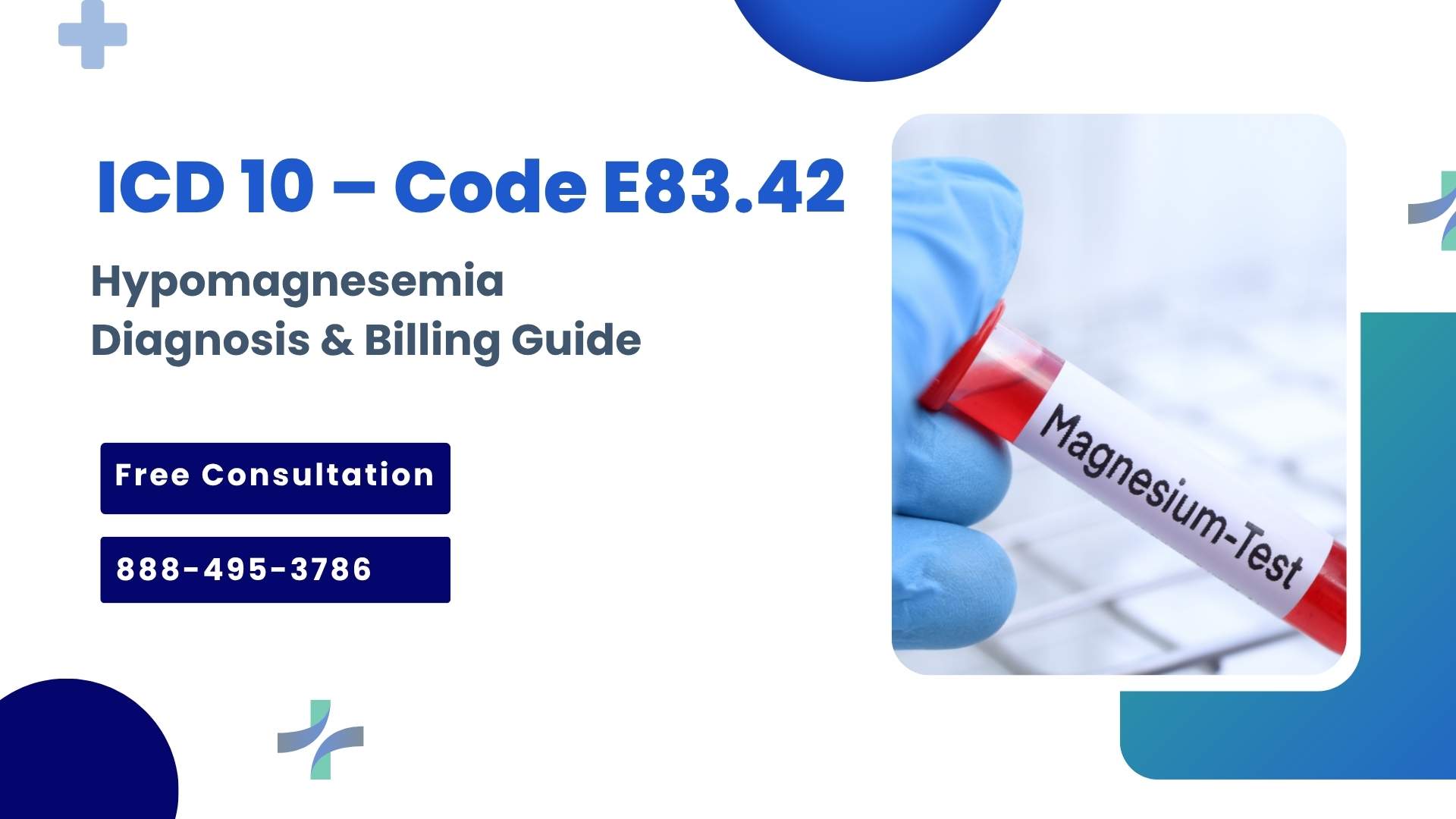Magnesium is important in muscle, nerve impulses, heartbeat, and bone health. Hypomagnesemia shows a low magnesium level in the blood. Due to this, severe health complications take place. The low magnesium level ICD-10 is E83.42, which is the official designation under which doctors name and diagnose this condition.
Failure to absorb sufficient magnesium in the body or when you lose an excessive amount either through the urinary outlet or the GIT can cause symptoms such as cramps, weakness, tremors, irregular heartbeat and even seizures.
The condition is particularly seen in individuals who have poor diets, alcoholic consumption, frequent diarrhea, or urinary complications with the kidneys. Let us learn about it deeply!
Hypomagnesemia ICD-10 Code – E83.42
In medical coding, the hypomagnesemia ICD-10 code is E83.42 and is used to identify the disease. This is classified under the broader classification of magnesium deficiency ICD-10 codes, which are under the endocrine and Metabolic disorders chapter.
It is applied in billing, insurance claims and electronic medical records. When entering E83.42, healthcare providers make sure to document the health condition properly, track the diagnosis, and cover reimbursements by insurance.
When to Use?
The doctors apply E83.42 when the patient has confirmed low magnesium level that is typically less than 1.7 mg/dL with other symptoms, such as fatigue, muscle aches, tingling or abnormal heart rhythm. The ICD-10 hypomagnesemia diagnosis must always rely on laboratory findings and the patient’s reported problems.
Take a patient as an example who has muscle cramps. His lab tests indicate the blood magnesium level as 1.3 mg/dL. After reading the report, the physician will call this hypomagnesemia and code it as an ICD-10 code for hypomagnesemia. In case of no symptoms or very little magnesium drop, the provider will not assign this code at all.
Causes of Low Magnesium
Hypomagnesemia has a lot of causes. It can either be a condition by itself or as a result of a different health condition. The most common causes are as follows:
- An unbalanced diet
- Kidney issues in which magnesium is urinated out
- More use of alcohol
- Taking drugs such as diuretics, antibiotics, etc.
- Less Vitamin D in the body
When there is a vitamin D deficiency, you must apply the vitamin D deficiency ICD-10 code, such as E55.9 “ Vitamin D deficiency, unspecified (ICD-10 e559)”
Treatment of Hypomagnesemia
The treatment depends on the level of low magnesium.
- If a patient is facing a severe condition, Doctors administer magnesium intravenously (IV), which helps them to increase the level fast. This is usual where there is a fatal low level or heart issues in the patient. The patient can also be admitted to the hospital for careful monitoring.
- Doctors normally prescribe magnesium tablets or syrups to their patients in mild cases. They also recommend that they consume food high in magnesium, such as spinach, bananas, nuts and seeds.
Also, doctors try to fix the cause of the deficiency. For example, they may stop a medication that is causing magnesium loss or treat diarrhea that is expelling minerals out of the body.
In some cases, electrolyte imbalances like hypomagnesemia may contribute to symptoms such as dizziness or vertigo. When documenting such symptoms, consider reviewing the correct use of ICD-10 code for BPPV – Benign Paroxysmal Positional Vertigo.
The Importance of Medical Documentation
To support the use of the hypomagnesemia ICD-10-CM code, it is necessary that doctors must clearly document the patient’s blood test results and any related symptoms. Without proper notes, insurance companies may reject claims, or the patient may not receive needed care.
The medical notes should include the following points:
- Blood magnesium level
- Signs and symptoms
- The underlying cause
- The treatment given
Proper documentation means no misuse of the ICD-10 code for hypomagnesemia unspecified (E83.40), which should only be used when there are not enough details about a more specific code.
Related ICD-10 Codes to Consider
Sometimes, low magnesium occurs due to other illnesses. To get complete information about the patient’s health, other ICD-10 codes may be used along with E83.42.
- N18.9 – Chronic kidney disease, unspecified
- E87.1 – Hyponatremia (low sodium)
- E87.2 – Metabolic acidosis
- E55.9 – Vitamin D deficiency, unspecified
- E55.0 ICD-10 code – Active rickets from vitamin D deficiency
- E11.9 – Type 2 diabetes without complications
When more than one issue is involved, the main condition is listed first, followed by E83.42 and the related deficiency codes.
Coding Mistakes to Avoid
The most common mistake is using the code of hypomagnesemia unspecified (E83.40) when the diagnosis is well-known. You cannot use it until research test results and symptoms indicate hypomagnesemia. In cases where the condition is clear, E83.42 is to be continuously used.
The next error is the failure to mention the related causes or symptoms. A good example is when you write just “low magnesium” in the record. Your note must have the particular level of magnesium, the associated symptoms and the management plan. Remember, insurance companies can also reject claims when information is incomplete.
How to Ensure Proper Billing
Insurance claims can be avoided when using the correct codes. Payments can be delayed or refused in case of wrong codes or unreadable notes. To bill properly, take care of the following:
- Resistively, magnesium level should always be less than 1.7 mg/dL
- Note other symptoms such as cramps, weakness or irregular heartbeats
- Include related problems like the vitamin D deficiency ICD-10 code or kidney disease
- Write the treatment types clearly (oral supplement or IV therapy)
- Do not use the ICD-10 code of hypomagnesemia unspecified when it is not necessary
The physician must keep detailed records to simplify billing and also benefit patient care.
Final Words!
Now we know that Hypomagnesemia is not as scary as it may sound. You just need to use the ICD-10 code, E83.42, which helps healthcare providers effectively manage this condition. Its accurate use is based on lab results, symptoms, and detailed documentation. Always make sure magnesium levels, related health issues, and treatments are correctly noted in the records.
Using the right code not only supports better patient care but also ensures smooth insurance billing. So, remember: E83.42 is your go-to code for low magnesium with confirmed symptoms, and facts, not guesswork, must back it. Smart coding means better care, fewer billing issues, and a clearer picture of the patient’s health.





